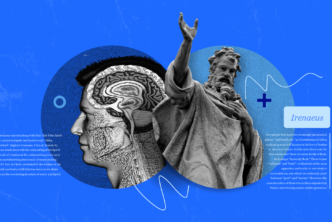I recently spoke to the founder of the Daily Dose of Greek, Robert L. Plummer (Professor of Biblical StudiesChairman at Southern Seminary) and his Hebrew-loving sidekick, Adam Howell (Assistant Professor of Old Testament Interpretation, Boyce College) about the story behind the Daily Dose phenomenon, the impact of the languages in ministry, and the value of their new partnership with Logos.
If you’ve spent any time at seminary, then you’ve probably heard of the Daily Dose of Greek (and its Hebrew and now Latin equivalents). If not, then the best way I can describe the Daily Dose is in medical terms: it’s intravenous drip-fluid therapy of the original languages straight to your veins. Every day you receive a link to a 2-minute video in which a world-class scholar blazes through a verse in the Bible, in the original languages, discussing the essential elements of definitions, tense forms, syntax, and more.
The great news is that the Daily Dose has partnered with Logos to bring you The Daily Dose of Greek and Hebrew, currently on preorder. Now you really have no excuse not to study the languages every single day!
What follows is the interview with Rob and Adam:
What is the backstory behind the Daily Dose of Greek (and Hebrew)?
Rob: About six years ago, I was in my mid-40s and rather than having a typical “mid-life crisis,” I began to be troubled by how many of my former Greek students apostatized from the language. What could I do, I asked myself, to help keep busy pastors, missionaries, and worship leaders reading the Greek New Testament for life?
Thankfully, the Lord brought several key people and technologies into my life at the same time. He seemed to be orchestrating all of these details so that I could pursue the vision he had given me.
Not long after I started the Greek site, we could see there would be a need/demand for a similar Hebrew service. I reached out to Mark Futato of RTS with my vision, and he was 100% on board. After producing hundreds of videos, he had to back out for a season. Both Adam Howell and Tom Blanchard are leading the Daily Dose of Hebrew forward in strength.
A key element of the ministry is the webmaster/administrator. The professors/screencasters could not do what we do without the technical support and expertise of a great webmaster. Our first webmaster was a UPS pilot, Brad Clark, who did the work in his spare time. We currently hire a part-time webmaster, Jonathan Ahlgren, who does a great job of editing videos and juggling multiple social media platforms.
How did you assemble the Daily Dose team of scholars (Rob, Tom, Mark, Adam)?
Rob: For the first Hebrew screencaster, Mark Futato, I did not know him at all. I called him “out of the blue” becaues of his reputation as an excellent and engaging teacher. Then, when he had to step down, I asked Adam Howell because of his similar reputation as a great Hebrew teacher who is also comfortable with newer technologies.
Tom Blanchard was a missionary in Switzerland when he reached out to us about doing a Hebrew screencast for francophones (see https://gardetonhebreu.com/). It was clear that Lord had also gifted him with a passion for teaching Hebrew well with the best technologies, and he has been producing excellent weekend videos for us. Tom is retired now in Arizona.
What has the response to the Daily Dose been like over the years? Do you have a large number of people engaging with the service as well as interacting with you personally when questions arise about the languages?
Rob: Frankly, the response has been overwhelming — in numbers and in the gratitude of subscribers. The statistics of Vimeo, YouTube, and the App Store inform us that last year our videos were viewed a total of 2.3 million times in more than 150 countries.
I regularly receive emails from pastors, students, and laypersons who are so grateful for how the daily dose screencasts are drawing them closer to the biblical text.
Adam: It seems as though the Daily Dose reaches further than we even know or would have imagined. The statistics we see for the locations around the world that our videos are viewed are always encouraging, because you find one country that is very small and yet there are several hundred views from that country. I can’t say for sure, but it’s encouraging to think there is a group of pastors there who are keeping up with their Greek and Hebrew.
As for the questions that we get, these are encouraging as well. It’s one thing for someone to watch a daily video, but to engage with it to the point of asking questions suggests that listeners are actually using these videos to retain their original language skills.
I replied to a letter just yesterday from a listener asking me about the pronunciation of the Divine Name (יהוה). She was a retired school teacher and wanted to begin learning Hebrew. I can’t speak for Rob, but even the questions I get are very encouraging that the mission and purpose of Daily Dose is being fulfilled.
What is the value of using the Daily Dose? Is 2 minutes a day enough for people to retain, or even improve, their languages?
Rob: Two minutes per day is a lot more than many pastors spend in their Greek New Testaments and Hebrew Old Testaments. Am I satisfied if 2 minutes is all our subscribers do? No, but I hope the daily screencasts help them revive or solidify their knowledge and make reading the Hebrew OT and Greek NT a regular part of their devotional and ministry lives.
The Daily Dose screencasts can serve as an “anchor” on which to build a lifetime of good Bible-reading habits. I encourage your readers to check out the books I co-authored, Hebrew for Life and Greek for Life, for more ideas for how folks can revive and strengthen their reading of Hebrew and Greek.
Adam: Rob always talks about Hebrew for Life and Greek for Life as a “paperback personal trainer” for the original languages, and I think that’s true. Certainly, we would love to know that listeners are doing more than just listening to the two-minute videos, but the real value of the videos is found in the simple act of being consistent with them.
One of the strategies mentioned in Hebrew and Greek for Life is to do a smaller amount of study more consistently. Many people get motivated to study the original languages and sit down at their desk for about three hours and then are simply overwhelmed or just tired.
However, I would argue that smaller chunks of study time that occur more regularly are more beneficial. So, the fact that these videos go out six days a week is more effective than that they are only two-minutes long.
From a ministry perspective, how does continued exposure to the languages help pastors and scholars-in-ministry accomplish their God-ordained duties?
Rob: Because the Bible is the Word of God, we want to be as close to the words of the apostles and prophets as we can. The Word of God is powerful, and we don’t want to be distanced from it by translational issues or our cultural/linguistic blindness.
Reading the Bible in the original languages causes us to be more thoughtful and careful about the actual wording of the text.
Adam: One of the things I tell my students is that if you hold to a certain interpretation or a certain theological conclusion, then it ought to be supported by the words, grammar, and syntax of the original languages.
As Rob said, we are working with the Bible, which is the Word of God, and so for those who have the opportunity to learn the original languages I think it’s important to do it well, so that the theological conclusions and interpretations we glean from the text of Scripture are supported by the words and grammar of the original languages.
So, for pastors and scholars-in-ministry, the regular exposure to and use of the original languages helps them to know where they are right and where they may be errant in their interpretation(s). I know there are many times that I consider a certain interpretation and then when I look at the original Hebrew, the grammar simply doesn’t support what I was thinking.
In that sense then, the original Hebrew helped me to fulfill my role of “rightly dividing” God’s Word. I have to imagine it is the same payoff for pastors who stay in the original languages.
How has the Daily Dose/Logos partnership come about, and what additional value does the Logos-based resource offer?
Rob: Logos is the premier biblical software for pastors and scholars. It’s wonderful to have a platform that integrates commentaries, biblical texts, lexicons, etc. Having the Daily Dose videos integrated with the Logos software is just another way of making those language helps more accessible to busy pastors.
Adam: I’m grateful for Logos’s interest in partnering with the Daily Dose to keep pastors and other Christians reading the Hebrew OT and Greek NT for life.
The effectiveness of the videos is only going to increase, now that they are being incorporated into the Logos platform. So, not only can they be effective for consistent study as an “anchor” that Rob mentioned, but also people will now be able to refer to them while preparing sermons or studying the original languages within Logos.
The videos are less “academic” than a language handbook, but they will at least be available to help someone work through a translation as they are studying. I’m excited to see how much the integration into Logos can extend the effectiveness of the Daily Dose content, as well as get more people using our resource.
Finally, what does the future hold for the Daily Dose? Have you planned to include other languages (Aramaic, Latin), expand the resource set, or create an online training program?
Rob: We actually have a Latin screencast where Dr. Tyler Flatt is going verse-by-verse through the Vulgate(see DailyDoseofLatin.com).
I have a passion to raise up biblical scholars in the major language groups of the world to provide a similar service in their native languages. We already have a Spanish Daily Dose of Greek, a Spanish Daily Dose of Hebrew, and a Korean Daily Dose of Greek. I think a Portuguese Daily Dose of Greek will be next!
By the way, the professors who record the screencasts do so on a volunteer basis. So, if any of your readers want to donate towards the mission, there is a donate button on the upper right of any of the aforementioned websites.
Thanks again for your interest in the Daily Dose ministry. I’m excited about this new partnership with Logos!
The Daily Dose of Greek and Hebrew resource for Logos is currently on pre-order, nearly funded (!), at a substantially discounted price of $119.99.
Jump on this opportunity now before Daily Dose ships to grab yourself a bargain, and recharge your Greek and Hebrew study for life. Click the image below:






